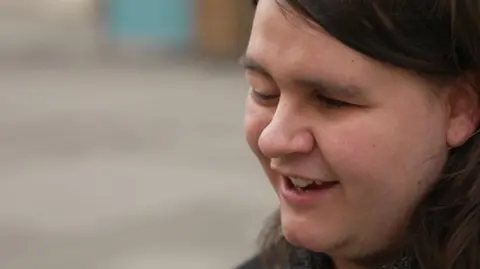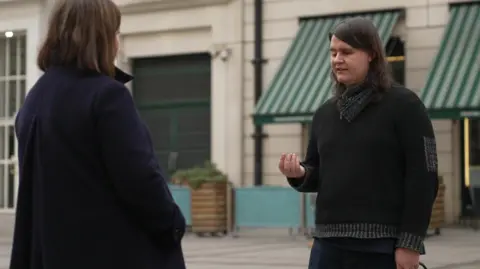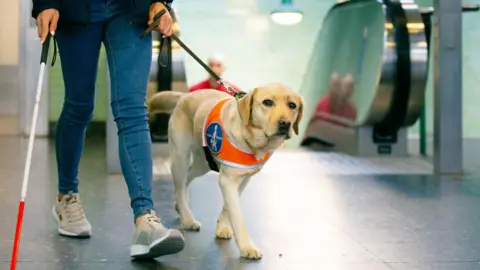'Not getting help from TfL knocked my confidence'
 BBC
BBCAs a blind Londoner, Kelsey felt badly let down when Transport for London (TfL) failed to offer assistance on the train twice in one day.
"It takes one or two negative experiences to plant that question in your mind every time that you travel," says Kelsey.
"It does not need to be the majority of times that things go wrong, it just needs to be a couple of times to shake your confidence."
Kelsey had expected assistance through the "turn-up-and-go" system, through which disabled passengers can get help from TfL staff when they arrive at a station - and assistance when they arrive at their destination.

But at both Willesden Junction and Dalston Kingsland, Kelsey says there was no-one there to help.
Despite the expectation of assistance on the train into Dalston at about 20:30 GMT last Saturday and on returning three hours later, both times Kelsey failed to receive it.
Kelsey told BBC London: "I am really lucky, I have the confidence to feel OK about asking for a bit of help.
"Being left late at night, or somewhere totally unfamiliar where you're feeling quite uncomfortable, that can be very difficult to shake out of your mind for months if not years to come."
Kelsey adds: "If we had a system that understood the needs of disabled people, and the way in which these kinds of incidents can make disabled Londoners feel… the fact it is 11 at night should make it even more essential that assistance is present."
TfL said Kelsey's experience was "unacceptable" and they pledged to investigate and speak to staff "to ensure that they know exactly what is expected of them".
 Getty Images
Getty ImagesMark Evers, chief customer officer at TfL, said: "Our vision is a London where everyone can move around the city safely, comfortably and sustainably.
"Access to public transport is fundamental to this, and we know that there is still much work to be done.
"Over the last year we have made the first steps to deliver more than 80 improvements to our network to make it more inclusive and accessible, as part of our Equity in Motion plan."
Mr Evers said TfL staff received ongoing customer service and disability equality training, which was developed "in conjunction with and delivered by professional trainers with lived experience of disability".
He added: "We will learn from Kelsey's experience to continue improving our services."
TfL says its turn-up-and-go service is offered on the Tube, London Overground and the Elizabeth line.
Staff at the station gate are expected to help customers plan a step-free journey, and assist them "through the station and on to the train, and arrange for staff at the destination station and any interchange stations to support them off the train including deploying boarding ramps if required".
'Always ask if you can help'
Kelsey says decision-makers need to have a "real understanding of both the immediate impact and the long-term confidence impacts of these kinds of incidents on disabled Londoners".
"The key thing here is offering assistance.
"There are people who are clearly trying to help in a way that can feel very intimidating, so grabbing my shoulder or my arm … if I am trying to get off a train for example, that ends up being much more dangerous.
"The general thing that I would always ask is if you feel that you can offer help please make that offer – politely ask if you can help – don't be offended if I say no.
"Even if I do say no I am grateful that you asked, and please don't let that put you off in the future."
Listen to the best of BBC Radio London on Sounds and follow BBC London on Facebook, X and Instagram. Send your story ideas to [email protected]
